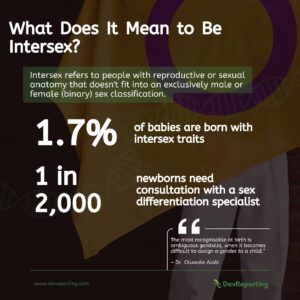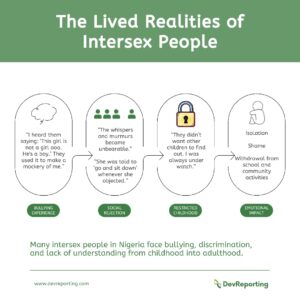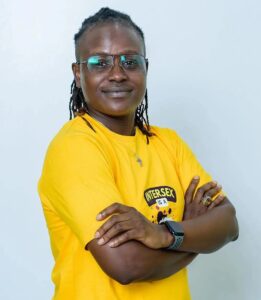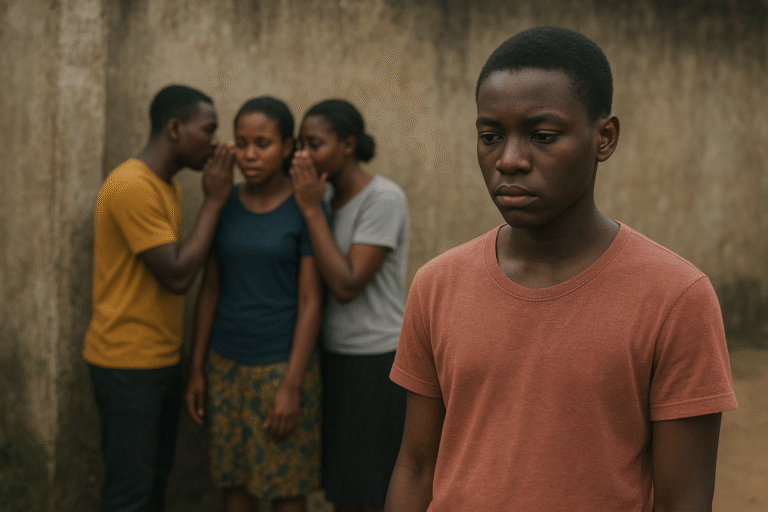In this eye-opening feature, Adejumo Kabir sheds light on the untold stories of intersex Nigerians battling stigma, secrecy, and identity struggles in a society that barely understands them.
Ifeoma Ugwu’s journey as an intersex individual began as a child. Growing up as a triplet, she couldn’t help but notice the differences in her body compared to her siblings. As a curious child, she would often ask her mother questions about her physical characteristics, wondering if her siblings were born with the same traits.
At one stage, her mother gave a gentle response that “God created her this way”. The response only added to her confusion.
When she was 12, her mother took her to a specialist hospital for surgery, but a doctor advised against it, warning of potential complications or even death.
READ ALSO: Collective Power, Not Tokenism: Women chart new political path ahead of 2027
Intersex refers to people with reproductive or sexual anatomy that doesn’t fit into an exclusively male or female (binary) sex classification.
Studies have shown that an estimated 1.7 per cent of babies are born with intersex conditions. About one in 2,000 newborns have genital differences that involve a sex differentiation specialist being consulted. While the traits are sometimes apparent at birth, in many cases, they might not appear until later during puberty or even adulthood.

In fact, a Nigerian Obstetrician and Gynaecologist with Ulster Hospital, Belfast, United Kingdom, Oluwole Alabi, noted that in rare cases, the traits could become apparent at postmortem.
“The most recognisable at birth is ambiguous genitalia, when it becomes difficult to assign a gender to a child. Others may become apparent when certain features are not in tandem with the assigned gender,” Mr Alabi said.
Among those whose traits are easily feasible is Ifeoma. As she grew older, she faced increasing bullying and harassment because in Nigeria and many other parts of the world, where there’s little or no knowledge about the natural variations in sex characteristics, being intersex is often viewed as a curse or a taboo, leading to widespread stigma, discrimination, and marginalisation.
Harassment, bullying
In a documentary by Intersex Nigeria, an NGO that raises awareness and advocate for the sexual reproductive health and overall human rights of intersex persons in Nigeria, Ifeoma explained that after a group of peers discovered her status in a bathroom, the mockery and ridicule that followed were relentless, making her feel isolated and ashamed.
Ifeoma said: “I like playing football and I was once privileged to go for a competition in Owerri, capital of Imo State. While in the general bathroom, an opposing player saw my genitals. I didn’t know until I heard them discussing me in the hostel.
“I was in the lounge hearing ‘this girl has this thing… oh, this girl is not a girl ooo. He’s a boy. She’s a boy o. This girl has something in her body like a penis’. I was so worried. I was very worried. They used it to make a mockery of me”.
READ ALSO: Reserved seat bill to take centre stage as women conference holds in Nigeria
When she returned to her base in Enugu State in southeastern Nigeria, the whispers and murmurs became unbearable. The news about her intersex status had spread like wildfire, and people couldn’t help but discuss it openly.
Ifeoma’s annoyance turned to frustration as she confronted the gossipmongers. “Who’s talking about this? Please, don’t discuss it again,” she pleaded. However, her words fell on deaf ears, and she was told to “go and sit down” each time she expressed her displeasure. The dismissal only added to her pain, highlighting the harsh reality of living in a society where differences are often met with ridicule.
Her football coach would later summon her for a conversation about her physical characteristics and asked her to confirm. With a deep breath, Ifeoma disclosed her intersex status. To her surprise, the coach responded with empathy, offering a heartfelt apology. Ifeoma’s response was gracious, acknowledging his kindness with a simple “thank you.”
This moment marked a rare instance of understanding and acceptance in her journey.

Born different
Ifeoma’s story is not unique. Many intersex individuals in Nigeria face similar challenges, including pressure to conform to societal norms and expectations. In fact, some are subjected to harmful medical interventions in an attempt to ‘normalise’ their bodies.
Loveth Ugwu had to navigate the complex web of identity. In the early days, while in secondary school, she was given sanitary pads, sparking confusion and curiosity.
“I came home and asked my sister, ‘what do they use this thing for? They gave it to us, and I don’t know what to do with it’. She was like, ‘hey bring it, bring it, you are not meant to use it.’ I said; Why am I not meant to use it? They gave it to me, they said I am a girl, and all girls use it. So why are you saying I cannot use it?”
“I was told that if I reach puberty, I will need sanitary pads. But I was already more than that age and nothing yet. All I discovered then was that my sister was covering up a lot of things,” she said.
READ ALSO: Nigerian menstrual health advocate bags international award – Development Reporting
Loveth’s parents went to great lengths to shield her from the world, with her mother, a teacher, even transferring her to her primary school to provide extra care. This overprotection, though well-intentioned, added to her isolation.
“When I was growing up, they did not allow me to play with some kids. They didn’t want other children to find out. I couldn’t play rough, couldn’t do what others did. I was always under watch,” he added.
Amidst the turmoil while growing up, Loveth found a lifeline in Intersex Nigeria, as the organisation helped her realise she wasn’t alone, empowering her to reclaim her identity.
“Intersex Nigeria really changed my life,” she said. “I now know I’m not alone.”
With newfound confidence, Loveth has found solace in blogging, cooking, and traveling, forging a path that’s uniquely hers.
Silent surgeries
Perhaps the most painful chapters come from those who were subjected to non-consensual surgeries as children. Olajumoke Akinnibi’s journey as an intersex person has been marked by struggle and pain.
Her experiences in primary and secondary school were particularly difficult. She withdrew from social interactions and gatherings due to feelings of shame and fear of being asked questions. This lack of confidence affected her academic performance, and she eventually stopped attending school.
Akinnibi’s encounters with medical professionals were also distressing. She underwent multiple surgeries under the supervision of her parents, but the doctors seemed uncertain about her condition, allegedly deploying approaches that ultimately reportedly proved harmful. Though Akinnibi doesn’t blame her parents for their decisions, she acknowledges the harm caused by these interventions.
“I went through several surgeries,” Akinnibi said. “Doctors didn’t even know what they were doing. They used me for trial and error. My parents meant well. They wanted me to be ‘normal’ but the surgeries were harmful.”
Across Nigeria, stories like Akinnibi’s are common. In 2021, the Kano State Government announced it had sponsored corrective surgeries for seven people with “intersex problems.” But human rights advocates argued that when such interventions are done without consent, they constitute intersex genital mutilation, a practice now banned in several countries for violating bodily autonomy.
According to Mr Alabi, though in some cases, “medical/surgical intervention may be required to help conform with the assigned gender, there are campaigns against some interventions now.”
Struggle for documentation
Assigned a female name at birth, Tosin Odulami has had to fight to assert her real identity. From community gatherings to medical settings, Tosin has faced countless challenges in being recognised and respected.
One of the most significant hurdles Tosin has faced is obtaining legal documents that accurately reflect her identity. Changing their name and ensuring that their documents align with their true self has been a long and arduous process.
“Surviving as an intersex hasn’t been easy; it has really been a tough experience and a tough moment because I wasn’t raised like that. I wasn’t brought up as a male, but I have to find myself in manhood and survive as a man.”
Tosin is advocating for the collection of data on intersex births, which would help to better understand and support individuals like them.
Finding strength
“I want the government to look into these unnecessary medical procedures, unconsensual medical interventions, and the intersex genital mutilation that a lot of intersex babies and teenagers pass through,” said Obioma Chukwuike, a human rights activist and environmental consultant. “As a person, we should have the right to choose what happens to our body.

Obioma, whose preferred pronoun is ‘they,’ faced numerous challenges, including severe stomach pains that led to multiple hospital visits while growing up. However, the physical pain was only the beginning of their struggles.
They recalled instances of being touched inappropriately and being asked invasive questions about their gender. “Are you a boy or a girl?” is a question Obioma has faced repeatedly. This lack of understanding and acceptance has made navigating everyday life a complex and often painful experience.
“I want people to accept me the way they accept a male and a female, or maybe I have a different gender identity, maybe as a non-binary person. My pronouns are ‘they/them’, but there are no provisions for that in this country. My passport and other identities still carry a female, and it’s problematic. There are neither policies nor laws that can help you navigate this. The available ones will rather make you face stigmatisation.”
They emphasised the need for medical professionals to understand and respect intersex bodies, rather than relying on trial and error approaches. “We need medical schools to start teaching about intersex bodies. Doctors must understand us, not just from textbooks, but from our realities.”
Obioma’s activism focuses on protecting the rights of intersex individuals in Nigeria, encouraging others to embrace their uniqueness and seek support from organisations like Intersex Nigeria.
By sharing their experiences and advocating for change, Obioma hopes to create a more inclusive and accepting society for all.
For many, meeting others like them has been transformative. “Before, I had low self-esteem, I withdrew from people,” said Akinnibi. “But when I started meeting other intersex people, I gained confidence. Life became easier.”
Medical expert speaks
Echoing Obioma’s position, the gynaecologist, Mr Alabi, noted that proper education is needed to sensitise the public on intersex management.
“People born with intersex traits are not to be stigmatised. Their parents deserve our support, not stigmatisation or ostracisation. They should be encouraged and supported to seek medical opinion. Such assessments require time and financial commitments,” he said.
The medical expert suggested that the government should take over the finances of the investigation and other ancillary expenses required of intersex people.
Speaking on the care for intersex people, Mr Alabi said various experts are usually involved in their management, saying these experts work together to achieve the desired outcome.
“Geneticists, endocrinologists, surgeons (sometimes), and mental health teams (especially the psychologists) are all involved in their extensive care. The healthcare professionals are equipped to provide information and education for all concerned. The individuals are encouraged to trust the professionals and heed their advice,” he counselled.
READ ALSO: Why women must lead climate research, advocacy – Prof. Ajayi – Development Reporting
Asked if there are any known risk factors or preventive measures that could reduce the likelihood of intersex conditions occurring, Mr Alabi said there are none to his knowledge.
He, however, said the use of androgens and progestogens in pregnancy may cause virillisation. “Those drugs are now being avoided. Perhaps pregnant women or those who are planning pregnancy should avoid such medicines.”
Human Rights Commission speaks
Speaking at the recently held Intersex Awareness Day in Lagos on Sunday, 26 Oct., the South-West Coordinator of the National Human Rights Commission (NHRC), Lucas Koyejo, expressed dissatisfaction with the misunderstanding and discrimination that intersex people face in Nigeria.
He explained that the Universal Declaration of Human Rights (1948), the 1999 Constitution of Nigeria, and the African Charter on Human and Peoples’ Rights guarantee the right to life, dignity, equality, and non-discrimination.
“Intersex persons continue to face misunderstanding and discrimination shaped by tradition, culture, and religion. Yet, every human being is born equal in dignity and rights, regardless of differences in sexual characteristics or identity. These laws protect the integrity of every person. Families must therefore break the silence, understand intersex children, and offer them love, support, and acceptance, not shame.”
He also called on health workers and public institutions to amplify awareness and promote the protection of intersex people’s rights, like those of every other human being.
“Health workers and institutions must provide ethical, rights-based care, while human rights agencies, ministries, civil society, and faith leaders should promote awareness and protection,” he added. “As the United Nations notes, the existence of intersex people is a fact of life, and protecting their rights is a matter of justice. We must build bridges of understanding and equality for all.”
Government’s involvement
According to the Director and Head of Gender, Adolescent, School Health and Elderly (GASHE) Division, Family Health Department in the Federal Ministry of Health, John Ovuoraye, engagement with the intersex community began in 2023 when Intersex Nigeria invited the ministry to a workshop in Abuja. “They started because they want to create awareness about themselves. They noticed that because they have differentiated sex characteristics which could not fit into male or female, and they could not fit into the old name of hermaphrodite either because that is derogatory or stigmatised.
“The concept in those days is that they tried to operate on them based on the physical phenotype they see, but there are internal characteristics that they may not know about until they grow up” he explained
Mr Ovuoraye said the ministry has since taken deliberate steps to build awareness among health workers and key departments. “We held a stakeholders’ meeting and invited people from different departments in the Federal Ministry of Health. Planning and Research in the case of data was carried along, the Department of Mental Health was also carried along, and the Hospital Services Department where some of them provide services thinking they are doing good by trying to change the person from either male or female was also involved. But all of these efforts are like a drop in the ocean. The entire sensitisation depends on resources,” he said.
He added that advocacy efforts are being extended beyond the medical sector to communities and faith groups. “We will be going outside the medical area to the people that matter including market women, traditional rulers, Christians and Muslims because when it comes to intersex issues, everybody has a stake in it.”
Clarifying misconceptions and mainstreaming inclusion
Mr Ovuoraye stressed the need to distinguish intersex conditions from sexual orientation, which are often wrongly conflated in public discussions.
He said, “Sometimes when we say intersex, people mix it up with LGBTQ which is not recognised by law here in Nigeria. That doesn’t mean that we don’t give them health care. Health is for all, therefore, the characteristics of one’s identity don’t need to play a role.
“At the same time, we don’t promote lesbianism, gay and those homosexual concepts because the laws of the land have not formally approved that. Intersex is a natural condition that occurs in people whose internal and external sex organs do not differentiate into one particular organ properly. They are in between”
The government official disclosed that the ministry is working to mainstream intersex issues into existing health policies rather than creating a stand-alone policy. “The process of mainstreaming is on, but it does not happen unless there’s a policy review,” he explained.
The ministry acknowledged that there are still major gaps to fill, especially in awareness and resource mobilisation. “There’s always a knowledge gap somewhere, maybe out of lack of information, but the next thing is to prioritise how to work around it.
“There’s always a knowledge gap somewhere, maybe out of lack of information, but the next thing is to prioritise how to work around it. Factors that limit our interventions are resources and the vastness of the country. For the message to sink to every nook and cranny of this country, it will take quite some time, but then it is good that we are discussing it.”
Editor’s Note: Interviews for this report were drawn from the testimonies of intersex people in a documentary titled “In Between Sexes” by Intersex Nigeria. This report highlights the urgent need for inclusive policy, medical ethics reform, and social acceptance for intersex persons across Nigeria.
Watch the documentary here!

